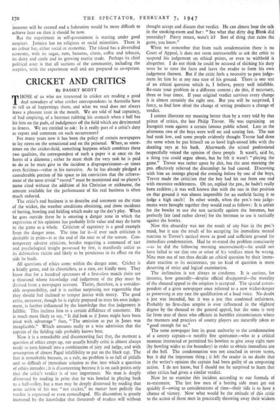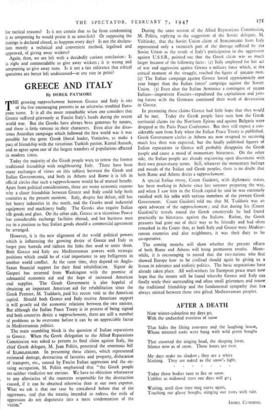CRICKET AND CRITICS
By BASSET SCOTT
THOSE of us who are interested in cricket are reading a good deal nowadays of what cricket correspondents in Australia have to tell us of happenings there, and what we read does not always leave a pleasant taste in the mouth. We are told of bad captaincy, of bad umpiring, of a batsman rubbing his stomach when a ball has hit him on the pads, of indulgences off the field which are detrimental to fitness. We are entitled to ask: Is it really part of a critic's duty to report and comment on such occurrences?
For many years now it has been the policy of certain newspapers to lay stress on the sensational and on the personal. When, as some- times on the cricket-field, something happens which combines these two qualities, the correspondent of such a paper is at once on the horns of a dilemma ; either he must shirk the very task he is paid to do or he must give to the incident a disproportionate—at times even fictitious—value in his narrative. As he has already pledged a considerable portion of his space to his conviction that the achieve- ment of the most trivial " record " must be mentioned and no player's name cited without the addition of his Christian or nickname, the amount available for the performance of his real business is often much reduced.
The critic's real business is to describe and comment on the state of the wicket, the weather conditions obtaining, and those incidents of batting, bowling and fielding which make up the day's play. When he goes outside these he is entering a danger zone in which the expression of his opinions has probably little value and may do harm to the game as a whole. Criticism of captaincy is a good example from the danger zone. The time for it—if ever such criticism is desirable in print—is at the end of the tour or of the season. Con- temporary adverse criticism, besides requiring a command of tact and psychological insight possessed by few, is manifestly unfair to its defenceless victim and likely to be pernicious in its effect on the side he leads.
All questions of ethics come within the danger zone. Cricket is a kindly game, and its chroniclers, as a race, are kindly men. They 'Mow that for a hundred spectators of a first-class match there are a thousand whose knowledge and judgement of the play must be derived from a newspaper account. Theirs, therefore, is a consider- able responsibility, and it is neither surprising nor regrettable that they should feel inclined to temper justice with' mercy. The good critic, moreover, though he is rightly prepared to trust his own judge- ment, is further influenced by the knowledge that that judgement is fallible. This inclines him to a certain diffidence of statement. He is much more likely to say, "It did look as if Jones might have been tried with advantage" than, "The omission to put in Jones was inexplicable." Which amounts really to a wise admission that the captain of the fielding side probably knows best.
Now it is a remarkable and disconcerting fact that, the moment a question of ethics crops up, our usually kindly critic is almost always ready to turn himself into a combination of jury n d judge, and with assumption of almost Papal infallibility to put on the black cap. The fact is remarkable because, as a rule, no problem is so full of pitfalls and so difficult of immediate solution as that into which a question of ethics intrudes ; it is disconcerting because it is on such points only that the critic's verdict is of vast importance. No man is deeply distressed by reading in print that he was bowled in playing back to a half-volley, but a man may be deeply distressed by reading that some action of his was "not cricket," no matter how politely the verdict is expressed or even camouflaged. His discomfort is greatly increased by the knowledge that thousands of readers will without
thought accept and discuss that verdict. He can almost hear the talk in the smoking-room and bar : "See what that dirty dog Blank did yesterday? Pretty rotten, wasn't it? Sort of thing that ruins the game, you know."
When we remember that from such condemnation there is no Court of Appeal, it does not seem unreasonable to ask the critic to suspend his judgement on ethical points, or even to withhold it altogether. I do not think he could be accused of shirking his duty were he to state the facts and leave the reader to form his own judgement thereon. But if the critic feels a necessity to pass judge- ment let him be at any rate sure of his ground. There is one test of an ethical question which is, I believe, pretty well infallible. Re-state your problem in a different context ; do this, if necessary, three or four times. If your original verdict survives every change it is almost certainly the right one. But you will be surprised, I fancy, to find how often': the change of setting produces a change of verdict.
I cannot illustrate my meaning better than by a story told by that prince of critics, the late Philip Trevor. He was captaining an Incogniti team against a certain famous public school. Late in the afternoon two of the boys were well set and scoring fast. The sun had sunk low, and some people evidently thought Trevor had done the same when he put himself on to bowl high-tossed lobs with the dazzling rays at his back. Afterwards, the school professional respectfully voiced the opinion of these people. It wasn't, said he, a thing you could argue about, but he felt it wasn't "playing the game." Trevor was rather upset by this, but the next morning, the pro. effectively relieved the discomfort he had caused. Discussing with him an innings played the everung before by one of the boys, Trevor made the criticism that the boy had hit out from one end with excessive recklessness. Oh no, replied the pro., he hadn't really been reckless ; it was well known that with the sun in that position on that ground it was almost impossible for an outfield facing it to judge a high catch!, In other words, when the pro.'s two judge- ments were brought together they would read as follows : It is unfair for the bowler to use the sun tactically against the batsman, but perfectly fair (and rather clever) for the batsman to use it tactically against the bowler.
Now this absurdity was not the result of any bias in the pro.'s mind, but it was the result of his accepting his immediate mental reaction to Trevor's tactical move as good and sufficient ground for immediate condemnation. Had he re-stated the problem consciously —as he did the following morning unconsciously—he could not have failed to see that one or other of his verdicts must be wrong. Nine men out of ten thus decide an ahical question by their imme- diate reaction to its occurrence, yet no kind of question is more deserving of strict and logical examination.
The inclination is not always to condemn. It is curious, for instance, how generally—despite official disapproval—the morality of the shouted appeal to the umpires is accepted. The special corres- pondent of a great newspaper once referred to a new wicket-keeper as possessing at any rate the qualification of a loud voice. No doubt a jest was intended, but it was a jest that condoned unfairness. Probably no first-class umpire is ever influenced in the slightest degree by the shouted or the general appeal, but the same is very far from true of those who officiate in humbler circumstances where the manners and practices of county players are naturally taken as "good enough for us."
The same newspaper lent its great authority to the condemnation of a county captain—a notably fine sportsman—who at a critical moment instructed or permitted his bowlers to give away eight runs (by bowling wides to the boundary) in order to obtain immediate use of the ball. The condemnation was not couched in severe terms, but it did the important thing ; it left the reader in no doubt that in: the writer's opinion the captain had been guilty of an unsporting action. I do not know, but I should not be surprised to learn that other critics had given a similar verdict.
Now let us examine this incident according to our formula of re-statement. The last few men of a batting side must get out quickly if—owing to considerations of time—their side is to have a chance of victory. Now What would be the attitude of this critic to the action of -these men in practically throwing away their wickets
for tactical reasons? Is it not certain that so far from condemning it as unsporting he would praise it as unse.fish? Or supposing the innings is declared closed, as happens every day? Is not the declara- tion merely a technical and convenient method, legalised and approved, of giving away wickets?
Again, then, we are left with a decidedly curious conclusion: It is right and commendable to give away wickets ; it is wrong and unsporting to give away runs. Is it not a fair inference that ethical questions are better left undiscussed—at any rate in print?



































 Previous page
Previous page